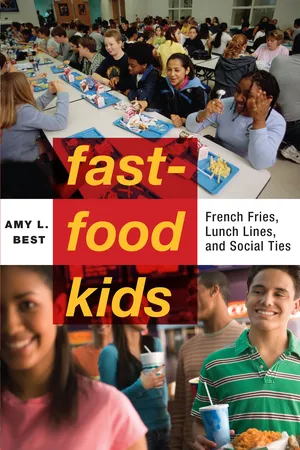
- 256 pages
- English
- ePUB (mobile friendly)
- Available on iOS & Android
About this book
2018 Morris Rosenberg Award, DC Sociological SocietyIn recent years, questions such as "what are kids eating?" and "who's feeding our kids?" have sparked a torrent of public and policy debates as we increasingly focus our attention on the issue of childhood obesity. The Centers for Disease Control and Prevention estimates that while 1 in 3 American children are either overweight or obese, that number is higher for children living in concentrated poverty. Enduring inequalities in communities, schools, and homes affect young people's access to different types of food, with real consequences in life choices and health outcomes. Fast-Food Kids sheds light on the social contexts in which kids eat, and the broader backdrop of social change in American life, demonstrating why attention to food's social meaning is important to effective public health policy, particularly actions that focus on behavioral change and school food reforms.Through in-depth interviews and observation with high school and college students, Amy L. Best provides rich narratives of the everyday life of youth, highlighting young people's voices and perspectives and the places where they eat. The book provides a thorough account of the role that food plays in the lives of today's youth, teasing out the many contradictions of food as a cultural object—fast food portrayed as a necessity for the poor and yet, reviled by upper-middle class parents; fast food restaurants as one of the few spaces that kids can claim and effectively 'take over' for several hours each day; food corporations spending millions each year to market their food to kids and to lobby Congress against regulations; schools struggling to deliver healthy food young people will actually eat, and the difficulty of arranging family dinners, which are known to promote family cohesion and stability.A conceptually-driven, ethnographic account of youth and the places where they eat, Fast-Food Kids examines the complex relationship between youth identity and food consumption, offering answers to those straightforward questions that require crucial and comprehensive solutions.
Frequently asked questions
- Essential is ideal for learners and professionals who enjoy exploring a wide range of subjects. Access the Essential Library with 800,000+ trusted titles and best-sellers across business, personal growth, and the humanities. Includes unlimited reading time and Standard Read Aloud voice.
- Complete: Perfect for advanced learners and researchers needing full, unrestricted access. Unlock 1.4M+ books across hundreds of subjects, including academic and specialized titles. The Complete Plan also includes advanced features like Premium Read Aloud and Research Assistant.
Please note we cannot support devices running on iOS 13 and Android 7 or earlier. Learn more about using the app.
Information
Table of contents
- Cover
- Copyright Page
- Dedication
- Contents
- Preface
- Acknowledgments
- Introduction: Fast-Food Kids
- 1. The Family Meal: Eating Together, Eating Apart
- 2. The Cafeteria as Great Equalizer: Making Food Good
- 3. The Cafeteria as Youth Space: Social Bonds and Barriers
- 4. Eat What’s Good for You: Class and the Cult of Health
- 5. I’m Lovin’ It: Fast Food and After-School Hot Spots
- Conclusion: Food Futures and Social Change
- Methods Appendix
- Notes
- References
- Index
- About the Author